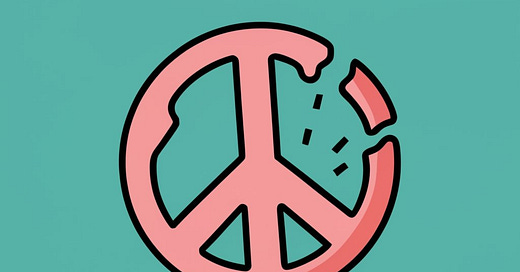Vol. 3, No. 21 — Broken in peaces
Financial markets have been oddly cool about the brutality in the Middle East; Despite the biggest bond losses ever, the financial system is robust; Value in cardboard boxes
HOUSEKEEPING: In the last issue (Vol. 3, No. 20), I wrote that Kimberly-Clark’s net income was $1.8m—it should have been $1.8bn. The mistake has been corrected. Sorry.
In this issue
Cartoon: Putting your money to work
Broken in peaces
Much hullabaloo about nothing
Cost of capital
Regions and sectors
Stock screen
Debt cycle monitor
Investment idea: DS Smith
Read time: 27 minutes
Quotation
"In investing, what is comfortable is rarely profitable."
— Robert Arnott
Cartoon: Putting your money to work
Broken in peaces
For its citizens, there is no peace in the Middle East. Yet, financial markets seem oddly cool about it all.
•••
It's been a horrible week for peace lovers. The escalating brutality in the Middle East has consumed the news cycle and political debate. Social and traditional media has lit up with mostly divisive and simplistic opinions. People are on edge about what's next. But financial markets have reacted with remarkable placidity.
Since Hamas's brutal attack, Israeli government bond yields have gone sideways, hovering between 4.2-4.3%. The shekel, Israel's national currency, is also effectively unchanged—it has dropped 1% against the dollar. You would think that markets would be reeling with almost 2,300 dead and over 8,000 injured. Instead, they're nonplussed. Why? The Bank of Israel announced it would sell $30bn in foreign reserves to prop up the currency while providing $15bn to support markets. That has stabilised the currency and bonds. It will also help ensure the country can buy weapons and goods from foreign companies.
Although global markets have had a somewhat muted reaction, weapons manufacturers have benefitted. Investors have added 6% to aerospace and defence firms' collective market caps globally. In contrast, the MSCI Israel ETF, an index of the 117 largest companies in Israel, has fallen 8%. For such a dramatic escalation, these seem like small movements. But they're historically normal. In the week following the September 11 attacks, the S&P 500 index of big American firms shed just 6%. While punters are pontificating wildly, traders have been far more equanimous.
As of publishing, none of the big three ratings agencies have stepped into the fray yet. Neither Moodys, S&P, nor Fitch have made any announcements. But they're usually slow to react and will want to monitor what unfolds before saying anything.
The world will be watching, waiting, and commiserating this grisly ordeal.
Much hullabaloo about nothing
Treasury securities underpin the financial system. But, despite the biggest bond losses ever, the financial system is robust.
•••
It's been a wild couple of years for bond investors. They've had to fight central banks, who, to tame inflation, have been hiking rates like mad. But these rate hikes also pushed up government bond yields, which have cut prices. As a result, fixed-income investors are sitting on enormous unrealised losses. Yet, despite the hubbub, this isn't a disaster. Only leveraged firms with a mismatch between what they owe, when, and what they have will get burned.






